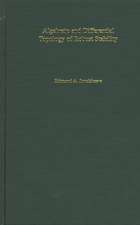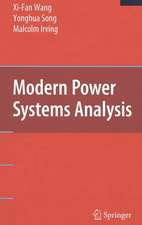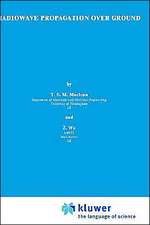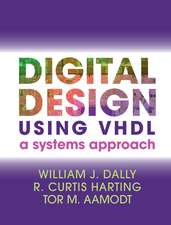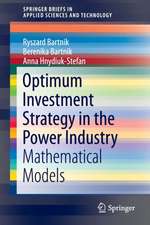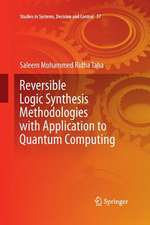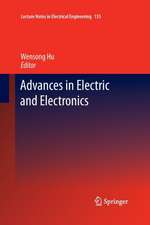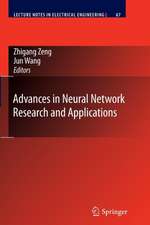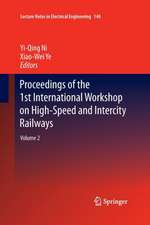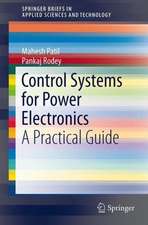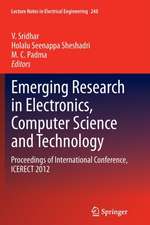Electrical Engineering 101: Everything You Should Have Learned in School...but Probably Didn't
Autor Darren Ashbyen Limba Engleză Paperback – 13 oct 2011
This third edition includes more real-world examples and a glossary of formulae. It contains new coverage of:
- Microcontrollers
- FPGAs
- Classes of components
- Memory (RAM, ROM, etc.)
- Surface mount
- High speed design
- Board layout
- Advanced digital electronics (e.g. processors)
- Transistor circuits and circuit design
- Op-amp and logic circuits
- Use of test equipment
- Gives readers a simple explanation of complex concepts, in terms they can understand and relate to everyday life.
- Updated content throughout and new material on the latest technological advances.
- Provides readers with an invaluable set of tools and references that they can use in their everyday work.
Preț: 176.64 lei
Preț vechi: 218.33 lei
-19% Nou
Puncte Express: 265
Preț estimativ în valută:
33.80€ • 35.29$ • 27.97£
33.80€ • 35.29$ • 27.97£
Carte tipărită la comandă
Livrare economică 28 martie-11 aprilie
Livrare express 27 februarie-05 martie pentru 78.56 lei
Preluare comenzi: 021 569.72.76
Specificații
ISBN-13: 9780123860019
ISBN-10: 0123860016
Pagini: 304
Ilustrații: Approx. 100 illustrations
Dimensiuni: 191 x 235 x 20 mm
Greutate: 0.61 kg
Ediția:3 Rev ed.
Editura: ELSEVIER SCIENCE
Locul publicării:Boston, MA, United States
ISBN-10: 0123860016
Pagini: 304
Ilustrații: Approx. 100 illustrations
Dimensiuni: 191 x 235 x 20 mm
Greutate: 0.61 kg
Ediția:3 Rev ed.
Editura: ELSEVIER SCIENCE
Locul publicării:Boston, MA, United States
Public țintă
Engineering students and beginning engineers. Experienced engineers needing a refresher; engineers from other disciplines needing a practical introduction to EE principles.Cuprins
Introduction: What is Electricity Really?
Chapter 1: Three Things They Should Have Taught in Engineering 101
Chapter 2: Basic Theory
Chapter 3: Pieces Parts
Chapter 4: The Real World
Chapter 5: Tools
Chapter 6: Troubleshooting
Chapter 7: Touchy Feely Stuff
Appendix
Chapter 1: Three Things They Should Have Taught in Engineering 101
Chapter 2: Basic Theory
Chapter 3: Pieces Parts
Chapter 4: The Real World
Chapter 5: Tools
Chapter 6: Troubleshooting
Chapter 7: Touchy Feely Stuff
Appendix
Recenzii
From Amazon.com reviews:
"This is a great book because the author is taking basic theory and providing the reader with some good intuitive tools to gain a foothold on how components work.
Many textbook authors in the circuit analysis arena (or electrical engineering as a broader area) tend to do one of 3 things:
a) Over explain a concept until the reader loses track of what he is doing
b) Skip too many steps in showing the derivation of a formula or the solving of a problem.
c) Place more emphasis on the mathematics associated with specific problem rather than the problems significance.
The author clearly avoids these traps. His text is reminiscent of a bygone era where engineering books actually sought to explain concepts and their significance."
"I would recommend this book to anyone interested in electronics. This book helped me understand concepts that I struggled with in class and for years after school."
"This is what more educational institutions need - someone who can take a subject and simplify it so that it is easy to recall. I have a BSEE and these topics were always taught from just a mathematical standpoint. The author takes the subject and teaches it in a way that is easily memorable."
"My background is Mechanical Engineering and I found this book to be extremely useful and interesting. I purchased this book in order to get a better understanding of the EE basics. Like most universities a ME takes an EE 101 course that is essentially a weed out course. The problem with a weed out course is that in the end you don't have a solid understanding of what the underlying basics are. If this sounds familiar, you should definitely buy this book."
"This book is an easy read after you've gone through EE. Makes you see the forest from the trees. Spend so much time in early circuits classes just trying to figure out currents, gains and voltages that all I could do was the math (the trees). This book has helped not only to review concepts, but to help me see what these components are doing (the forest). Enjoying the book."
"I enjoyed this book very much. I especially liked the software on the CD, which had nice tools to work with. I enjoyed the clarity in the writing and the informal style. I was having trouble grasping concepts in some of the more formal books on EE, which made it sound more like magic than science. The way the author related EE concepts to mechanical ones helped tremendously. I recommend this book highly, if you are new to electronics."
"This is a great book because the author is taking basic theory and providing the reader with some good intuitive tools to gain a foothold on how components work.
Many textbook authors in the circuit analysis arena (or electrical engineering as a broader area) tend to do one of 3 things:
a) Over explain a concept until the reader loses track of what he is doing
b) Skip too many steps in showing the derivation of a formula or the solving of a problem.
c) Place more emphasis on the mathematics associated with specific problem rather than the problems significance.
The author clearly avoids these traps. His text is reminiscent of a bygone era where engineering books actually sought to explain concepts and their significance."
"I would recommend this book to anyone interested in electronics. This book helped me understand concepts that I struggled with in class and for years after school."
"This is what more educational institutions need - someone who can take a subject and simplify it so that it is easy to recall. I have a BSEE and these topics were always taught from just a mathematical standpoint. The author takes the subject and teaches it in a way that is easily memorable."
"My background is Mechanical Engineering and I found this book to be extremely useful and interesting. I purchased this book in order to get a better understanding of the EE basics. Like most universities a ME takes an EE 101 course that is essentially a weed out course. The problem with a weed out course is that in the end you don't have a solid understanding of what the underlying basics are. If this sounds familiar, you should definitely buy this book."
"This book is an easy read after you've gone through EE. Makes you see the forest from the trees. Spend so much time in early circuits classes just trying to figure out currents, gains and voltages that all I could do was the math (the trees). This book has helped not only to review concepts, but to help me see what these components are doing (the forest). Enjoying the book."
"I enjoyed this book very much. I especially liked the software on the CD, which had nice tools to work with. I enjoyed the clarity in the writing and the informal style. I was having trouble grasping concepts in some of the more formal books on EE, which made it sound more like magic than science. The way the author related EE concepts to mechanical ones helped tremendously. I recommend this book highly, if you are new to electronics."

